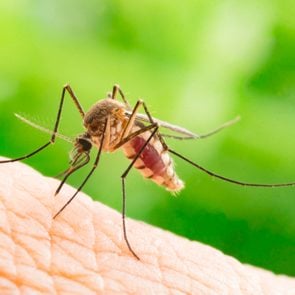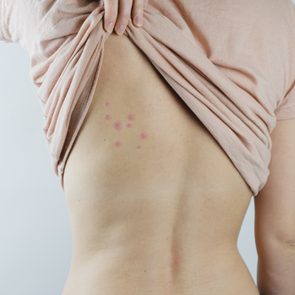Here’s How to Tell the Difference Between a Chigger Bite and a Mosquito Bite
Updated: Mar. 14, 2022
Are those tiny red marks from a chigger bite or a mosquito bite? Here's what you need to know to tell the difference and to protect yourself.
Chigger bites vs. mosquito bites
Summer brings warm weather, sun, and the threat of bites from creepy crawlies. Chiggers and mosquitoes are among the many that feed off both humans and animals leaving similar red bites. This can make it difficult to identify what bit you. Was it a chigger? Was it a mosquito? Here’s how to tell the difference between a chigger bite and a mosquito bite.
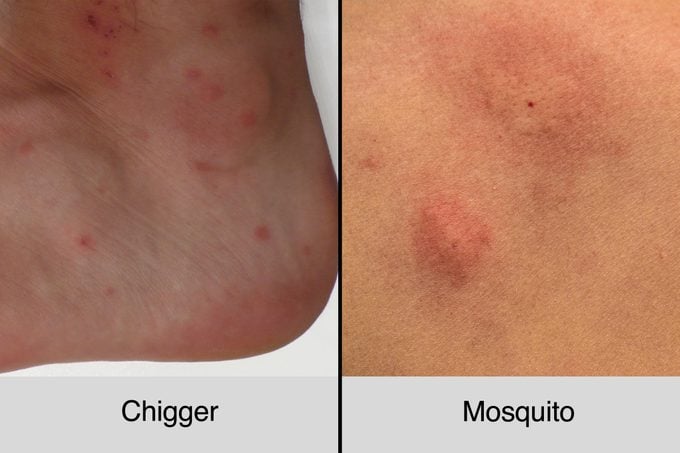
Where you’ll find chiggers
Chiggers are typically found in wild plantings, gardens, pollinator habitat, woods and brush, long grass fields, trail edges, dense shrubbery, or even on short, manicured lawns. Chiggers can be found anywhere in the United States, but the bugs are most common in the Midwest, South, and Southeast. The species can be found around the world and there are more than 50 types that bite humans. (Here’s how you can tell the difference between a chigger bite and a bed bug bite.)
Where you’ll find mosquitos
Mosquitoes thrive near standing or stagnant water on every continent except Antarctica. That’s a lot of real estate when you think of all the places you can find standing water—birdbaths, outdoor planters, kiddy pools, leaf cluttered gutters, tree holes, and woodland pools. (Remove stagnant water and try these chemical-free insect repellents to keep bugs at bay.)
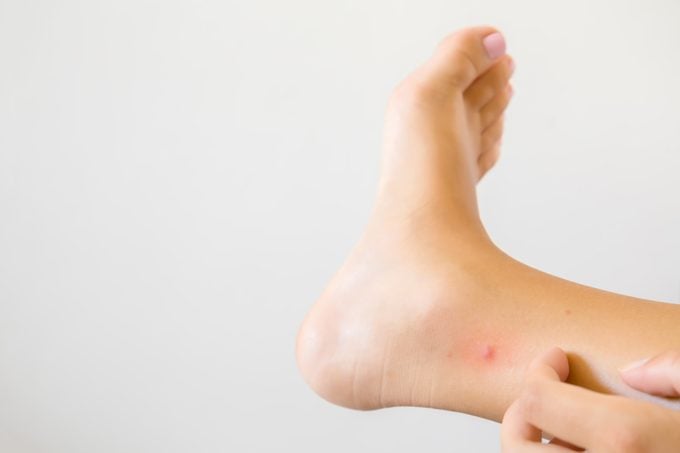
Chigger and mosquito bite symptoms
While chigger and mosquito bites both come with an itch, chigger bites take the prize: They cause intense itching that can last a week or more, while victims of mosquito bites tend to itch lasts for three or four days. Chigger bites are incredibly annoying but don’t pose a danger to your health. For the most part, mosquito bites are harmless, but you have to be cautious: Some species carry serious diseases. (You can ward off mosquitoes by stocking up on these repellents.)
Chigger bites
Chiggers typically stick to biting below the beltline. Sometimes the bites can be further north in moist areas such as the armpits and bra line area. Chiggers are looking for a liquified skin cell meal and can find one easily by crawling from the ground to your bare feet (or shoes) and attaching to the skin, explains entomologist Jody Green, at the University of Nebraska, Lincoln. Bites often appear as small, reddish, bumps that look like pimples, with severe itching that is often worse at night. Green was bitten by chiggers and described it as “the most annoying and most intensely insane itching I’ve experienced.”
The bugs may seek out areas that feel protected, like a waistband, bra line, or the top of socks. “They will migrate to areas of ‘protection,’ and in this case, you can see multiple little bites in a line along the waist, for example,” says dermatologist Adam Friedman, MD, professor and interim chair of dermatology at The George Washington University School of Medicine & Health Sciences.
Mosquito bites
Thanks to their flying ability, mosquitoes have easy access to your face, ears, and scalp—not to mention any other exposed area of your body. (Here’s are 9 things that help keep mosquitos away.) Mosquitoes are out for blood, but only female mosquitoes bite. “Females bite because they require blood to produce eggs,” says Green.
Mosquito bites don’t have a definitive style, and the reaction to any insect bite depends on an individual’s own immune response. “They can be singular or grouped, only found in one area or widespread, pink to red raised bumps that are very itchy,” says dermatologist Joesph Zahn, MD, assistant professor of dermatology at the George Washington University Medical Faculty Associates. “Sometimes the bites mimic hives, and sometimes blisters can occur at the bite.” You might also have puffy, swollen white to red bumps, hard and itchy red-brown bumps, blisters, or sometimes dark spots that look like bruises, says Dr. Zahn. (Be sure to read the do’s and don’ts guide to mosquito bites.)
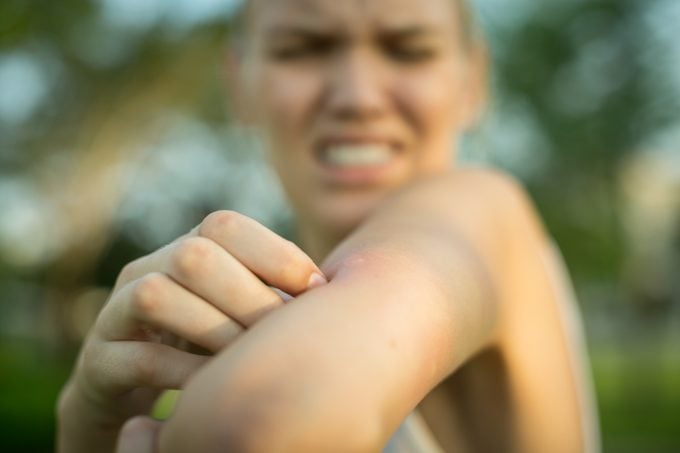
How long does it take to see a reaction?
Chigger bite reaction
Chigger bites can occur at any time when you’re outside, day or night. You might think, “What just bit me?” but you probably won’t see the reddish bite marks that look like pimples or feel the miserable itching right away. Dr. Friedman says the reaction usually kicks in between six and 12 hours after the bite, but they may take longer. (Chigger bites aren’t dangerous, but you should keep an eye out for these dangerous bugs this summer.)
Mosquito bite reaction
When you think of the mosquito bites you’ve gotten in the past, you’re likely to associate it to summer evenings. It seems like you get bitten when you’re chilling on the deck, or even more frustrating—when you’re trying to sleep and hear that telltale buzzing of the female mosquito dive-bombing your ear. If a mosquito is able to latch on and begin drinking her blood cocktail, she’ll inject saliva with anti-coagulants to keep the blood flowing. (Bed bugs also like a good blood meal: Here’s are the key differences of a chigger bite vs. a bed bug bite.)
Mosquito saliva also contains proteins that trigger a response from your immune system, which releases compounds called histamines to battle the intruders. The histamines are what lead to itching, swelling, and redness. “Most people will notice a mosquito bite from several minutes to up to a day or so after the bite,” says Dr. Zahn. (Try these 8 food home remedies for mosquitoes.)
Treatment for bites
Chigger bites
Why do chigger bites itch so long? “Chiggers pierce the skin with a small mouthpart and secrete enzymes into your skin, breaking it down,” explains Green. “At the same time, they create a channel or tube (called a stylostome) to suck up the liquified skin cells.” A chigger’s combination of breaking into the skin and feeding for a while adds to the length of time you will itch. You’re basically going to feel itchy until new skin starts to grows over the little sucking tubes the chigger made. When Green got bit, she says, it took about one week of “untrollable itching.” For others, it can take two weeks to a month.
To get relief from itching, Dr. Friedman has a few suggestions. “Oral antihistamines or topical corticosteroid creams/ointment. Cold compresses (ice, frozen peas) may also help to obscure the sensation and limit swelling.” (Here’s how to make your own DIY doctor-approved ice packs with things you already have in your house.)
See a doctor if:
When the itching is making you miserable and nothing is helping, call your doctor or dermatologist to see about a prescription for a higher potency topical steroid. It’s essential to keep the scratching at a minimum or you might get a secondary skin infection. Dr. Friedman says to call your doctor if you have pain, swelling, pus (white or greenish discharge), fever, weakness, or joint pain. (This is why you shouldn’t scratch a bug bite.)
Mosquito bites
You can tell yourself to stop scratching, but that’s easier said than done for most. Dr. Zahn recommends camphor or menthol in a lotion or gel formula. Lotions with the active ingredient pramoxine are especially soothing when they’re stored in the refrigerator. “Cooling sensations help with the itch in general, as they appear to ‘confuse’ nerves in our skin that transmit itch sensation, and diminish their effects,” says Dr. Zahn. If that doesn’t curb the itch, Dr. Zahn suggests topical a corticosteroid such as over-the-counter hydrocortisone. (Here are 7 natural remedies for mosquito bites.)
See a doctor if:
Some people may react to the mosquito saliva with more intense itching and welts. As with chigger bites, it’s critical to stop scratching to avoid a secondary infection. Call your dermatologist or doctor to prescribe something a little more potent if the itch is uncontrollable. More troublesome symptoms such as fever, headache, or body ache may be a sign of a more serious infection or a mosquito-borne illness, which means it’s time to call your doctor.
The Zika virus is concerning, but there have been no confirmed cases since 2018, according to the Centers for Disease Control and Prevention (CDC). West Nile disease is another mosquito-borne virus: About one in five people develop a fever with other symptoms such as headache, vomiting, diarrhea, joint pains, body aches, and rash. Even fewer—just under one percent, develop a serious or fatal neurological disorder, explains the CDC. (These are the bug bites that need medical attention—now.)
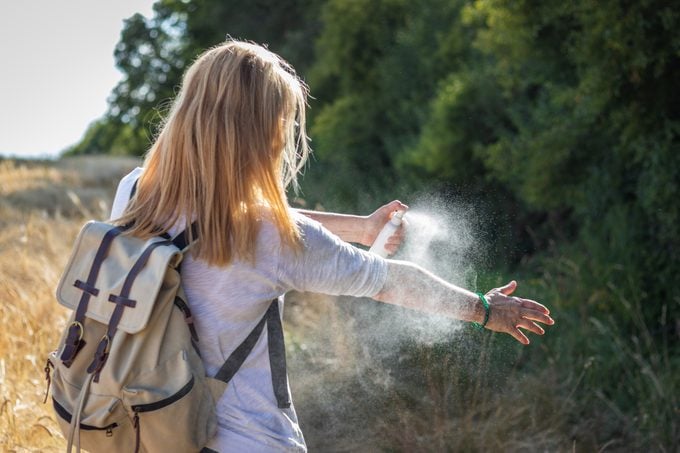
How to prevent bites
Chiggers
Chiggers can travel beyond their preferred habitat of woods, fields, tall grass, and trail edges, warns Green. That’s why you shouldn’t walk barefoot or sit directly on the grass. The best way to prevent chigger bites is to cover up: “Wear long pants, long sleeves, shoes, boots to cover up and keep chiggers on the outside. Tuck your pants into your shoes or boots and tuck your shirt into your pants,” advises Green. She also recommends wearing permethrin-treated clothing and also DEET (25 to 30 percent) on the skin.
Chiggers can hitch-hike on clothing, so you can also prevent bites by immediately taking a shower and scrubbing your skin once you get inside. Be sure to wash and dry soiled clothes on high heat to kill chiggers. Wipe down shoes and boots. You can also cut the chances of getting chigger bites by keeping turf short and vegetation trimmed. Green says you can spray your yard with insecticides called pyrethroids (look for the active ingredient, bifenthrin) to suppress chiggers, but spraying large areas can kill beneficial insects and pollinators. (Don’t overlook these surprising hazard zones in your backyard.)
Mosquitoes
Peak biting hours are dawn and dusk Green says. Either avoid outdoor activities or prepare yourself with a barrier of protection. Wear clothing treated with the insect repellent permethrin, or spray permethrin solution on your clothing. Use EPA-approved repellents on the skin. “These include DEET, Picaridin, oil of lemon eucalyptus, and IR3535,” says Green. “Wear light-colored, loose-fitting clothing because mosquitoes prefer dark colors and can bite through fabric.” Make your yard less attractive to mosquitoes by dumping standing water every five days so that eggs don’t have time to hatch. Another trick to keep mosquitos from getting too comfortable is to create a little breeze with an oscillating fan or ceiling fan while you’re sitting on the patio or deck. Green says this discourages mosquitos from landing. (Don’t miss these 10 ways to prevent mosquito bites in your sleep.)




















